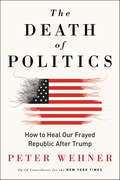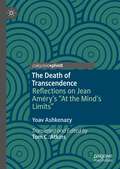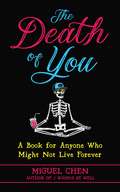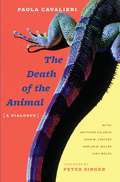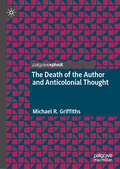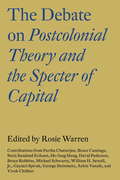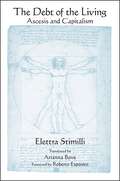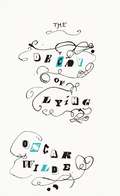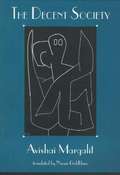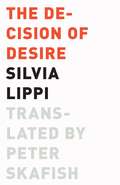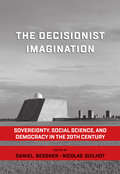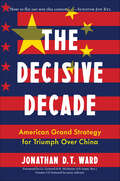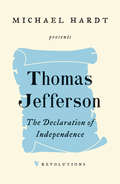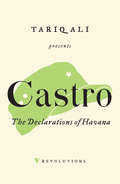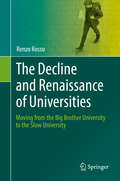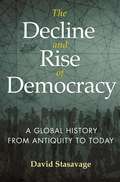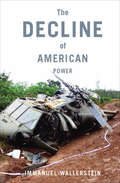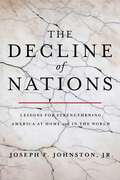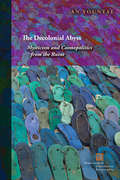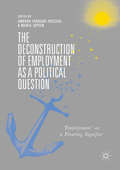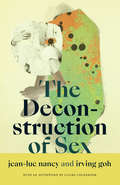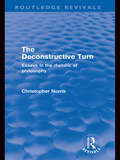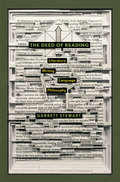- Table View
- List View
The Death of Politics: How to Heal Our Frayed Republic After Trump
by Peter WehnerThe New York Times opinion writer, media commentator, outspoken Republican and Christian critic of the Trump presidency offers a spirited defense of politics and its virtuous and critical role in maintaining our democracy and what we must do to save it before it is too late. “Any nation that elects Donald Trump to be its president has a remarkably low view of politics.” Frustrated and feeling betrayed, Americans have come to loathe politics with disastrous results, argues Peter Wehner. In this timely manifesto, the veteran of three Republican administrations and man of faith offers a reasoned and persuasive argument for restoring “politics” as a worthy calling to a cynical and disillusioned generation of Americans. Wehner has long been one of the leading conservative critics of Donald Trump and his effect on the Republican Party. In this impassioned book, he makes clear that unless we overcome the despair that has caused citizens to abandon hope in the primary means for improving our world—the political process—we will not only fall victim to despots but hasten the decline of what has truly made America great. Drawing on history and experience, he reminds us of the hard lessons we have learned about how we rule ourselves—why we have checks and balances, why no one is above the law, why we defend the rights of even those we disagree with. Wehner believes we can turn the country around, but only if we abandon our hatred and learn to appreciate and honor the unique and noble American tradition of doing “politics.” If we want the great American experiment to continue and to once again prosper, we must once more take up the responsibility each and every one of us as citizens share.
The Death of Transcendence: Reflections on Jean Améry’s “At the Mind’s Limits”
by Yoav AshkenazyThe Death of Transcendence presents a clear and compelling close reading and interpretation of the five essays included in Jean Améry’s At the Mind’s Limits, describing them as one continuous and progressing argument on the possibility of human society in the wake of the Holocaust. Through the thought of Ludwig Wittgenstein, Iris Murdoch, J.M. Bernstein and, Charles Taylor, Ashkenazy uncovers the importance and significance of such concepts as transcendence, lose, self, other, love, and home for establishing and maintaining a human life and world, and recovering it, should it be lost. Written with both clarity and academic rigour, this book offers novel ideas, firmly grounded in existing philosophical literature, and is intended for both professional scholars and general readers of Améry.
The Death of You: A Book for Anyone Who Might Not Live Forever
by Rod Meade Sperry Miguel ChenA yoga teacher, punk rock bassist, and Buddhist teaches from experience on how approaching death and grief with a little more compassion and a little less fear will make for a better life—and a better death, too.DEATH. Even the word itself probably makes you a little uncomfortable. Just look at it, sitting there, demanding to be acknowledged. It might even make you a lot uncomfortable. We spend so much time trying to deny death, going on about our lives as if we and our loved ones are immune to it. Then, one day, its truth becomes undeniable. The Death of You doesn’t flinch in looking into this vital, urgent matter. Join Miguel for a wild ride where we get real about death—and even have a few laughs at its expense. If you might someday die—or if you know someone who will—this book is for you. If you’re afraid of dying, this book is for you. If you’re excited about the Great Unknown, this book is for you. In plainspoken, kind, and encouraging language, Miguel will show you how to transform your relationship with death—and in doing so, you'll get to know your life in a whole new way. Today is the perfect day to start. Don’t wait—you’re not gonna live forever.
The Death of the Animal: A Dialogue
by Paola CavalieriWhile moral perfectionists rank conscious beings according to their cognitive abilities, Paola Cavalieri launches a more inclusive defense of all forms of subjectivity. In concert with Peter Singer, J. M. Coetzee, Harlan B. Miller, and other leading animal studies scholars, she expands our understanding of the nonhuman in such a way that the derogatory category of "the animal" becomes meaningless. In so doing, she presents a nonhierachical approach to ethics that better respects the value of the conscious self.Cavalieri opens with a dialogue between two imagined philosophers, laying out her challenge to moral perfectionism and tracing its influence on our attitudes toward the "unworthy." She then follows with a roundtable "multilogue" which takes on the role of reason in ethics and the boundaries of moral status. Coetzee, Nobel Prize winner for Literature and author of The Lives of Animals, emphasizes the animality of human beings; Miller, a prominent analytic philosopher at Virginia Polytechnic Institute, dismantles the rationalizations of human bias; Cary Wolfe, professor of English at Rice University, advocates an active exposure to other worlds and beings; and Matthew Calarco, author of Zoographies: The Question of the Animal from Heidegger to Derrida, extends ethical consideration to entities that traditionally have little or no moral status, such as plants and ecosystems. As Peter Singer writes in his foreword, the implications of this conversation extend far beyond the issue of the moral status of animals. They "get to the heart of some important differences about how we should do philosophy, and how philosophy can relate to our everyday life." From the divergences between analytical and continental approaches to the relevance of posthumanist thinking in contemporary ethics, the psychology of speciesism, and the practical consequences of an antiperfectionist stance, The Death of the Animal confronts issues that will concern anyone interested in a serious study of morality.
The Death of the Author and Anticolonial Thought
by Michael R. GriffithsThe Death of the Author and Anticolonial Thought promises to transform a decades old debate in literary studies about the relation between structure and agency, form and intention by giving a detailed account—previously unstudied—of the way colonized writers have responded to, learned from, and critiqued the death of the author postulate declared by Roland Barthes in 1967. The book is a cultural history of these debates—with a particular focus on two crucial two key case studies, Martinican poet and thinker Édouard Glissant and Palestinian literary and cultural critic Edward Said, this book, then, examines the immediate emergence and intensification of such responses to the postulate of the author’s deathly absence from the text, in order to suggest that metropolitan literary theory drew both critique and engagement from scholars of black, decolonial and Global South background from both before 1967 and Barthes’s declaration and in its wake. This book provides a focused account of the early history of the way global literatures have engaged with, critiqued, and occasionally adopted the lessons and limitations of the poststructuralist critique of that most fetishised and also reviled of figures: the author.
The Debate on Postcolonial Theory and the Specter of Capital
by Vivek Chibber Partha Chatterjee Gayatri Chakravorty Spivak Achin Vanaik Rosie WarrenLeading thinkers' critiques of award-winning Postcolonial Theory, as well as the author's responses and reformulationsVivek Chibber's Postcolonial Theory and the Specter of Capital was hailed on publication as "without any doubt ... a bomb," and "the most substantive effort to dismantle the field through historical reasoning published to date." It immediately unleashed one of the most important recent debates in social theory, ranging across the humanities and social sciences, on the status of postcolonial studies, modernity, and much else. This book brings together major critics of Chibber's work to assess the efficacy of his argument from differing perspectives. Included are Chibber's own spirited responses and reformulations in light of these criticisms. With contributions by Partha Chatterjee, Gayatri Spivak, Bruce Robbins, Ho-fung Hung, William H. Sewell, Jr., Bruce Cumings, George Steinmetz, Michael Schwartz, David Pederson, Stein Sundstøl Eriksen, and Achin Vanaik.
The Debt of the Living: Ascesis and Capitalism (SUNY series in Contemporary Italian Philosophy)
by Elettra StimilliMax Weber's account of the rise of capitalism focused on his concept of a Protestant ethic, valuing diligence in earning and saving money but restraint in spending it. However, such individual restraint is foreign to contemporary understandings of finance, which treat ever-increasing consumption and debt as natural, almost essential, for maintaining the economic cycle of buying and selling.In The Debt of the Living, Elettra Stimilli returns to this idea of restraint as ascesis, by analyzing theological and philosophical understandings of debt drawn from a range of figures, including Saint Paul, Schmitt and Agamben, Benjamin and Marx, Nietzsche and Freud, and Foucault. Central to this analysis is the logic of "profit for profit's sake"—an aspect of Weber's work that Stimilli believes has been given insufficient attention. Following Foucault, she identifies this as the original mechanism of a capitalist dispositif that feeds not on a goal-directed rationality, but on the self-determining character of human agency. Ascesis is fundamental not because it is characterized by renunciation, but because the self-discipline it imposes converts the properly human quality of action without a predetermined goal into a lack, a fault, or a state of guilt: a debt that cannot be settled. Stimilli argues that this lack, which is impossible to fill, should be seen as the basis of the economy of hedonism and consumption that has governed global economies in recent years and as the premise of the current economy of debt.
The Decay of Lying: The Decay Of Lying, Pen, Pencil And Poison, The Critic As Artist, The Truth Of Masks (Penguin Great Ideas)
by Oscar Wilde'Life imitates Art far more than Art imitates Life'The two works brought together here, 'The Decay of Lying' and 'The Critic as Artist', are Oscar Wilde's wittiest and most profound writings on aesthetics, in which he proposes that criticism is the highest form of creation and that lying, the telling of a beautiful untruth, is the ultimate aim of art.One of twenty new books in the bestselling Penguin Great Ideas series. This new selection showcases a diverse list of thinkers who have helped shape our world today, from anarchists to stoics, feminists to prophets, satirists to Zen Buddhists.
The Decent Society
by Avishai Margalit Naomi Goldblum<P>Avishai Margalit builds his social philosophy on this foundation: a decent society, or a civilized society, is one whose institutions do not humiliate the people under their authority, and whose citizens do not humiliate one another. <P>What political philosophy needs urgently is a way that will permit us to live together without humiliation and with dignity. Most of the philosophical attention nowadays is drawn to the ideal of the just society based on the right balance between freedom and equality. The ideal of the just society is a sublime one but hard to realize. The decent society is an ideal which can be realized even in our children's lifetime. We should get rid of cruelty first, advocated Judith Shklar. Humiliation is a close second. There is more urgency in bringing about a decent society than in bringing about a just one. Margalit begins concretely where we live, with all the infuriating acts of humiliation that make living in the world so difficult. He argues in a concrete way in the spirit of Judith Shklar and Isaiah Berlin. <P>This is a social philosophy that resists all those menacing labels that promote moral laziness, just as it urges us to get beyond the behavior that labels other human beings. Margalit can't be earmarked as liberal or conservative. If a label is necessary, then the most suitable is George Orwell's humane socialism, a far cry from Animal Farm socialism with its many tools of oppression. How to be decent, how to build a decent society, emerges out of Margalit's analysis of the corrosive functioning of humiliation in its many forms. This is a thoroughly argued and, what is much more, a deeply felt book that springs from Margalit's experience at the borderlands of conflicts between Eastern Europeans and Westerners, between Palestinians and Israelis.
The Decision of Desire (Univocal)
by Silvia LippiA unique rereading of Lacan&’s theory of desire and its link to masochism, joy, mysticism, death, and feminine jouissance Of all of Lacan&’s reconceptualizations of Freudian psychoanalytic discourse, the most misunderstood are those concerning human beings&’ relation to the unconscious play of desire and the neurosis stemming from their attachment to the phallic function. An interpretive tour de force that engages works by surrealists such as André Breton, canonical writers like William Faulkner and James Joyce, and the philosophers Jean-Paul Sartre, Emmanuel Levinas, and Baruch Spinoza, The Decision of Desire is groundbreaking in its proposal that each of us can seek out and reimagine our relation to the infinite aporias of desire and thereby detach from its destructive, repetitive forms in favor of joy and affirmation. Providing insight to the lay reader of psychoanalytic theory as much as to practicing psychoanalysts, The Decision of Desire is a bold reengagement with the legacy of the notion of desire within psychoanalysis and the quandary of how to assume responsibility for desires. For if desire is always already that of the Other and the unconscious, and also a decision that escapes our consciousness of ourselves, how can we assume an ethical relation to it that avoids the vicious circle of disappointment, neurosis, and destruction? Such is the decision of desire attempted within Silvia Lippi&’s profound development of a contemporary psychoanalytic thought.
The Decisionist Imagination: Sovereignty, Social Science and Democracy in the 20th Century
by Nicolas Guilhot Daniel BessnerIn the decades following World War II, the science of decision-making moved from the periphery to the center of transatlantic thought. The Decisionist Imagination explores how “decisionism” emerged from its origins in prewar political theory to become an object of intense social scientific inquiry in the new intellectual and institutional landscapes of the postwar era. By bringing together scholars from a wide variety of disciplines, this volume illuminates how theories of decision shaped numerous techno-scientific aspects of modern governance—helping to explain, in short, how we arrived at where we are today.
The Decisive Decade: American Grand Strategy for Triumph Over China
by Jonathan D. WardWith a focus on the economic battlefront and in-depth analysis of the diplomatic, military, and ideological arenas, the world’s foremost expert on US-China global competition offers a rousing, strategic call to action and playbook—harvesting all of our nation’s ingenuity, confidence, and will power—to outcompete the long-term strategies of China and its Communist Party. In The Decisive Decade, Dr. Jonathan D.T. Ward—China scholar and founder of the Atlas Organization, a consultancy focused on US-China global competition—offers a comprehensive framework for how the United States can, and must, defeat China on the world stage economically, diplomatically, militarily, and ideologically. International security and American supremacy are at stake—and now is the time for the US to take action. China’s global power and influence grows every day. Working from a deep sense of national identity, the Chinese Communist Party is leading its country toward what it deems “the great rejuvenation of the Chinese Nation,” and executing a long-term Grand Strategy to topple over its chief adversary, the United States. As China becomes increasingly repressive domestically and aggressive overseas, it threatens to upend America’s global dominance at every turn. Ward provides novel and practical strategies that our government, as well as our businesses and our citizens, can utilize to undermine our adversary. Exhaustive campaigns in the economic, diplomatic, military, and ideological arenas, he argues, must be taken to achieve victory. With expert analysis of the history of US-China relations, as well as insight into how the Russia-Ukrainian war can inform our strategic thinking, The Decisive Decade presents a unique toolkit for our triumph over China. We can succeed, but it won’t be easy; it will take all of our nation’s ingenuity, confidence, and willpower to win.
The Declaration of Independence: Thomas Jefferson's Manuscript Draft From The Collections Of The American Philosophical Society (Books Of American Wisdom Ser.)
by Thomas JeffersonCo-author of the groundbreaking Empire and Multitude, Michael Hardt examines the Declaration of Independence and other texts by Jefferson, arguing that his powerful concept of democracy provides a biting critique of the current American administration. Introducing this collection of Jefferson&’s writings, Michael Hardt makes a powerful case for re-examining the foundational writings of this American revolutionary in order to reignite the dialogue that first conceived of a &“land of the free.&”
The Declarations of Havana (Revolutions Ser.)
by Tariq Ali Fidel CastroIn response to the American administration’s attempt to isolate Cuba, Fidel Castro delivered a series of speeches designed to radicalize Latin American society. As Latin America experiences more revolutions in Venezuela and Bolivia, and continues to upset America’s plans for neo-liberal imperialism, renowned radical writer and activist Tariq Ali provides a searing analysis of the relevance of Castro’s message for today.
The Decline and Renaissance of Universities: Moving from the Big Brother University to the Slow University
by Renzo RossoInstead of following the Magna Charta Universitatum, the declaration of the principles of knowledge signed in 1988 in Bologna, the academic approach pursued in Europe and the other continents over the past 30 years has strictly employed a utilitarian model of higher education. This jeopardizes academic freedom, shared governance and tenure, the three pillars of the long-established model of universities. Scientific conformism and fragmentation, educational bias and authoritarianism are the major drawbacks, together with a poor readiness to meet the emerging challenges in the labor market and technology. In this book, Renzo Rosso presents a new model for countering these developments, e.g. by establishing novel democratic rules for university governance. The Slow University paradigm positions culture and education as essential tools for the long-term survival of humankind.
The Decline and Rise of Democracy: A Global History from Antiquity to Today (The Princeton Economic History of the Western World #96)
by David StasavageA new understanding of how and why early democracy took hold, how modern democracy evolved, and what this teaches us about the futureHistorical accounts of democracy’s rise tend to focus on ancient Greece and pre-Renaissance Europe. The Decline and Rise of Democracy draws from global evidence to show that the story is much richer—democratic practices were present in many places, at many other times, from the Americas before European conquest, to ancient Mesopotamia, to precolonial Africa. Delving into the prevalence of early democracy throughout the world, David Stasavage makes the case that understanding how and where these democracies flourished—and when and why they declined—can provide crucial information not just about the history of governance, but also about the ways modern democracies work and where they could manifest in the future.Drawing from examples spanning several millennia, Stasavage first considers why states developed either democratic or autocratic styles of governance and argues that early democracy tended to develop in small places with a weak state and, counterintuitively, simple technologies. When central state institutions (such as a tax bureaucracy) were absent—as in medieval Europe—rulers needed consent from their populace to govern. When central institutions were strong—as in China or the Middle East—consent was less necessary and autocracy more likely. He then explores the transition from early to modern democracy, which first took shape in England and then the United States, illustrating that modern democracy arose as an effort to combine popular control with a strong state over a large territory. Democracy has been an experiment that has unfolded over time and across the world—and its transformation is ongoing.Amidst rising democratic anxieties, The Decline and Rise of Democracy widens the historical lens on the growth of political institutions and offers surprising lessons for all who care about governance.
The Decline of American Power: The U. S. In A Chaotic World
by Immanuel WallersteinThe internationally renowned theorist contends that the sun is setting on the American empire in this &“lucid, informed, and insightful&” account (The New York Times). The United States currently finds itself [a] superpower that lacks true power, a world leader nobody follows and few respect, and a nation drifting dangerously amidst a global chaos it cannot control. The United States in decline? Its admirers and detractors alike claim the opposite: America is now in a position of unprecedented global supremacy. But in fact, Immanuel Wallerstein argues, a more nuanced evaluation of recent history reveals that America has been fading as a global power since the end of the Vietnam War, and its response to the terrorist attacks of 9/11 looks certain to hasten that decline. In this provocative collection, the visionary originator of world-systems analysis and the most innovative social scientist of his generation turns a practiced analytical eye to the turbulent beginnings of the twenty-first century. Touching on globalization, Islam, racism, democracy, intellectuals, and the state of the left wing, Wallerstein upends conventional wisdom to produce a clear-eyed—and troubling—assessment of the crumbling international order. &“[Wallerstein&’s thought] provides a new framework for the subject of European history . . . it is compelling, a new explanation, a new classification, indeed a revolutionary one, of received knowledge and current thought.&” —Fernand Braudel
The Decline of Mercy in Public Life
by Alex Tuckness John M. ParrishThe virtue of mercy is widely admired, but is now marginalized in contemporary public life. Yet for centuries it held a secure place in western public discourse without implying a necessary contradiction with justice. Alex Tuckness and John M. Parrish ask how and why this changed. Examining Christian and non-Christian ancient traditions, along with Kantian and utilitarian strains of thought, they offer a persuasive account of how our perception of mercy has been transformed by Enlightenment conceptions of impartiality and equality that place justice and mercy in tension. Understanding the logic of this decline, they argue, will make it possible to promote and defend a more robust role for mercy in public life. Their study ranges from Homer to the late Enlightenment and from ancient tragedies to medieval theologies to contemporary philosophical texts, and will be valuable to readers in political philosophy, political theory, and the philosophy of law.
The Decline of Nations: Lessons for Strengthening America at Home and in the World
by Joseph F. Johnston Jr.In The Decline of Nations, Joseph F. Johnston delivers riveting lessons on the U.S. government viewed through the lens of excessive centralization and deterioration of the rule of law.The Decline of Nations takes an in-depth look at the condition of the contemporary United States and shows why Americans should be deeply concerned. It tackles controversial subjects such as immigration, political correctness, morality, religion and the rise of a new elite class. Author Joseph Johnston provides many historical examples of empires declining, including the Roman and British empires, detailing their trajectory from dominance to failure, and, in the case of Britain, subsequent re-emergence as modern day nation. Johnston delivers riveting lessons on the U.S. government viewed through the lens of excessive centralization and deterioration of the rule of law. He demonstrates the results of weak policies including the surging Progressive movement and the expanding Welfare state. In The Decline of Nations, Johnston asks important questions about diminished military capacity, a broken educational system, and the decline of American arts and culture. He questions the sustainability of the nation's vast global commitments and shows how those commitments are threatening America's strength and prosperity. There is no historical guarantee that the United States can sustain its economic and political dominance in the world scene. By knowing the historic patterns of the great nations and empires, there is much to be learned about America's own destiny.
The Decolonial Abyss: Mysticism and Cosmopolitics from the Ruins (Perspectives in Continental Philosophy)
by An YountaeThe Decolonial Abyss probes the ethico-political possibility harbored in Western philosophical and theological thought for addressing the collective experience of suffering, socio-political trauma, and colonial violence. In order to do so, it builds a constructive and coherent thematization of the somewhat obscurely defined and underexplored mystical figure of the abyss as it occurs in Neoplatonic mysticism, German Idealism, and Afro-Caribbean philosophy.The central question An Yountae raises is, How do we mediate the mystical abyss of theology/philosophy and the abyss of socio-political trauma engulfing the colonial subject? What would theopoetics look like in the context where poetics is the means of resistance and survival? This book seeks to answer these questions by examining the abyss as the dialectical process in which the self’s dispossession before the encounter with its own finitude is followed by the rediscovery or reconstruction of the self.
The Deconstruction of Employment as a Political Question: 'Employment' as a Floating Signifier
by Amparo Serrano-Pascual Maria JepsenThe wide-ranging European perspectives brought together in this volume aim to analyse, by means of an interdisciplinary approach, the numerous implications of a massive shift in the conception of ‘work’ and the category of ‘worker’. Changes in the production models, economic downturn and increasing digitalisation have triggered a breakdown in the terms and assumptions that previously defined and shaped the notion of employment. This has made it more difficult to discuss, and problematise, issues like vulnerability in employment in such terms as unfairness, inequality and inadequate protection. Taking the ‘deconstruction of employment’ as a central idea for theorising the phenomenon of work today, this volume explores the emergence of new semantic fields and territories for understanding and regulating employment. These new linguistic categories have implications beyond language alone: they reformulate the very concept of waged employment (including those aspects previously considered intrinsic to the meaning of work and of being ‘a worker’), along with other closely associated categories such as unemployment, self-employment, and inactivity.
The Deconstruction of Sex (a Cultural Politics book)
by Jean-Luc Nancy Irving GohIn The Deconstruction of Sex, Jean-Luc Nancy and Irving Goh discuss how a deconstructive approach to sex helps us negotiate discourses about sex and foster a better understanding of how sex complicates our everyday existence in the age of #MeToo. Throughout their conversation, Nancy and Goh engage with topics ranging from relation, penetration, and subjection to touch, erotics, and jouissance. They show how despite its entrenchment in social norms and centrality to our being-in-the-world, sex lacks a clearly defined essence. At the same time, they point to the potentiality of literature to inscribe the senses of sex. In so doing, Nancy and Goh prompt us to reconsider our relations with ourselves and others through sex in more sensitive, respectful, and humble ways without bracketing the troubling aspects of sex.
The Deconstructive Turn: Essays in the Rhetoric of Philosophy (Routledge Revivals)
by Christopher NorrisWhat might be the outcome for philosophy if its texts were subjected to the powerful techniques of rhetorical close-reading developed by current deconstructionist literary critics? When first published in 1983, Christopher Norris’ book was the first to explore such questions in the context of modern analytic and linguistic philosophy, opening up a new and challenging dimension of inter-disciplinary study and creating a fresh and productive dialogue between philosophy and literary theory.
The Deed of Reading: Literature * Writing * Language * Philosophy
by Garrett StewartGarrett Stewart begins The Deed of Reading with a memory of his first hesitant confrontation, as a teenager, with poetic density. In that early verbal challenge he finds one driving force of literature: to make language young again in its surprise, coming alive in each new event of reading. But what exactly happens in the textual encounter to make literary phrasing resonate so deeply with readers?To take the measure of literary writing, The Deed of Reading convenes diverse philosophic commentary on the linguistics of literature, with stress on the complementary work of Stanley Cavell and Giorgio Agamben. Sympathetic to recent ventures in form-attentive analysis but resisting an emphasis on so-called surface reading, Stewart explores not some new formalism but the internal pressures of language in formation, registering the verbal infrastructure of literary prose as well as verse. In this mode of "contextual" reading, the context is language itself. Literary phrasing, tapping the speech act's own generative pulse, emerges as a latent philosophy of language in its own right, whereby human subjects, finding no secure place to situate themselves within language, settle for its taking place in, through, and between them.Stewart watches and hears this dynamics of wording played out in dozens of poems and novels over two centuries of English literary production--from Wordsworth and Shelley to Browning and Hopkins, from Poe and Dickens through George Eliot, Conrad, James, and on to Toni Morrison. The Deed of Reading offers a revisionary contribution to the ethic of verbal attention in the grip of "deep reading."
